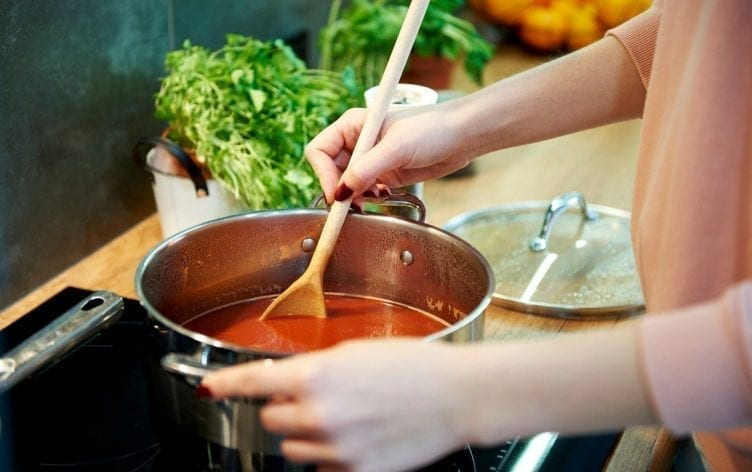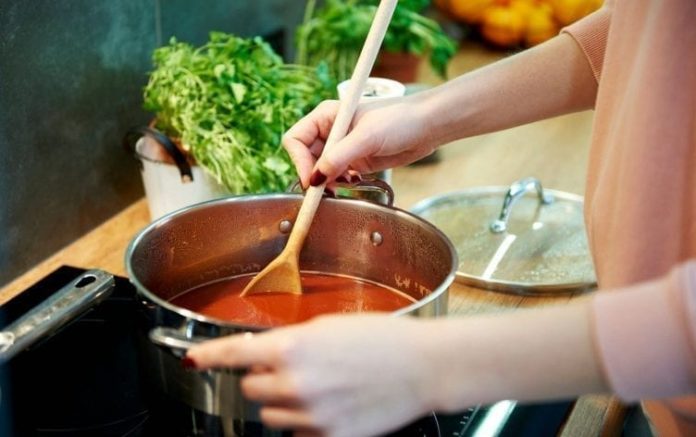
Since the COVID-19 pandemic, many of us have become increasingly interested in what we can make in our own kitchens, from Instagram-worthy sourdough loaves and desserts to pickled goods. Now that summer’s arrived, it’s the perfect time to sharpen your culinary skills for backyard barbeques and get-togethers with family and friends.
“Home-cooked meals, snacks and even desserts tend to contain fewer calories, added sugar, salt and fat compared to restaurant-prepared or highly-processed, packaged foods,” says Lexi Endicott, registered dietitian and culinary nutrition specialist with To Taste. They’re also typically higher in nutrients which can reduce your risk of chronic diseases, like diabetes and cancer, while supporting your slim-down efforts.
Beyond these benefits, preparing your own food presents the opportunity to connect with those you’re cooking with, teach your children essential skills, and save money.
One of the most common barriers to making your own food is not having enough free time. Here’s how to eat well at home this summer without spending all day in the kitchen.
HOW TO MAKE THE SHIFT TO HOMEMADE FOODS
To avoid burnout, start small by setting a goal to make 3–5 meals or snacks at home per week, says Alka Chopra, RD. If that sounds like too much for your schedule, try one or two at a time. Leveling up slowly with specific goals is the key to changing your habits for good.
It helps to make the process as easy as possible, too, with go-to “formulas” or recipes you can tweak for varieties on a theme, adds Abbie Gellman, a chef and registered dietitian based in New York City.
Now that you’re ready to get started, here are eight foods worth making yourself and how to do it, with expert insight from registered dietitians and chefs.
1
FRUIT YOGURT
Fruit-flavored yogurt cups are convenient and seem healthy, but they’re often packed with added sugar. For a summer-inspired homemade alternative, make a chia fruit jam mixed with plain, 0% Greek yogurt.
“Chia seeds are a great source of omega-3 fatty acids and fiber, helping you feel nice and full,” says Amanda Li, RD. “All you need are 2 cups (480 ml) of fresh or frozen fruit, 2 tablespoons (30ml) of chia seeds and yogurt.”
Simmer the fruit in a pot until it’s softened (about 5 minutes), mash with the back of a fork, and stir in the chia seeds. Let cool for 15 minutes before serving with yogurt. The jam can also be used as a topping for toast or ice cream sundaes, she notes.
2
GRANOLA
For warm-weather hiking fuel, nothing beats a handful of crunchy granola. “Most store-bought granolas contain way too much added sugar and not enough fiber, which is incredibly important for gut health, heart health, weight management and blood sugar control,” says Endicott.
To make your own, whisk together 2 tablespoons of brown sugar, 1/4 cup of canola oil, 1/4 cup (59ml) of natural liquid sweetener, such as honey or maple syrup, and 1/2 teaspoon of salt. Then, add 3 cups (710 ml) of oats and 2–3 cups of raw nuts (480-710 ml), and spread it all onto a baking sheet. Bake for 1 hour at 250ºF (121ºC), stirring every 15 minutes.
After it’s done cooking and has cooled, add mix-ins of your choice, such as dark chocolate chips or dried fruit. Save more time by making it in bulk. And once you’ve become a pro, get fancy with tropical granola or cocoa espresso almond granola.
3
SALAD DRESSING
Salad dressing is one of the easiest foods to DIY in order to cut down on added sugar, salt and unnecessary gums and stabilizers, says Micah Siva, a registered dietician and chef.
For a basic vinaigrette to go with a light summer salad, all you need is a jar, heart-healthy olive oil and balsamic vinegar or lemon juice in a 3:1 ratio, plus a touch of honey and Dijon mustard to keep it creamy. Another option? “Next time your favorite jam is nearly empty, add your dressing ingredients and shake for a fruity dressing,” she suggests.
4
PROTEIN BOWL
“A protein bowl is essentially a pumped up salad, but it is full of nutrients and easily packable for a nutritious meal on the go,” says Gellman. With healthy fats, complex carbs, and protein, it makes for an easy-to-prep lunch that keeps you full and helps ward off midday sluggishness.
Here’s the 5-ingredient formula for hundreds of meals: whole grains (such as quinoa or brown rice), high-quality protein (like tuna, chickpeas, black beans, chicken or hard-boiled eggs), vegetables (chopped leafy greens, carrots and bell peppers or leftovers from last night’s dinner), dressing (homemade vinaigrette or creamy Greek yogurt), and toppings (nuts, feta cheese or salsa).
5
RED LENTIL CREPES
Most of us eat far too much salt, and the single largest source of it in the American diet is … the sandwich. Since store-bought bread is the highest-sodium food, per the Centers for Disease Control & Prevention, swapping your sammy for a wrap made with red lentils can make a big difference for a healthy picnic lunch.
“Red lentil crepes require only one ingredient and are a fabulous source of plant-based protein, folate, iron, magnesium and fiber — nutrients that many fall short on,” says Li.
Thoroughly rinse 1 cup (237 ml) of red split lentils, soak them in 2 cups (473 ml) of water overnight, then blend them together. Heat a skillet over medium heat, spray it with oil and ladle in 1/2 cup (118 ml) of the lentil batter. Swirl it around and cook 2–3 minutes on each side. Enjoy with hummus, cream cheese, jam, peanut butter or scrambled eggs and salsa, she suggests.
6
SPAGHETTI SAUCE
One surprising source of added sugar in our diets is pasta sauce, but it’s pretty easy to start making your own, sans the sweet stuff.
Mix 1, 15 oz can of no-sodium added tomato juice, 1 cup (237 ml) of marinara and 1/2 cup (118 ml) of strained tomatoes, advises Chopra. Let it boil for 15–20 minutes, add salt, pepper and aromatics such as garlic powder, parsley and basil, and you’re good to add the protein and pasta of your choice.
“It’s quick, simple and freezes very well for those days when I don’t feel like cooking,” she says.
7
FROZEN YOGURT
Summer and fro-yo just go together, but making your own can help you cut down on added sugar and fat while upping your intake of satiating protein as well as vitamin C, potassium and fiber found in fresh fruit, says Li.
There’s only one special ingredient you need: 1 tablespoon (15 ml) of hydrolyzed collagen or collagen peptide powder. Add that to 1 1/4 cup (296 ml) of frozen fruit plus 1/4 cup (59 ml) plain, 0% Greek yogurt and blend to puree.
Pro tip: “For an ultra-creamy texture, try mangoes, peaches, cherries and bananas,” she suggests. For frozen dessert fans, “n’ice” cream — made with frozen bananas, milk and cocoa powder — could be worth a try, too.
8
CHOCOLATE CAKE
Store-bought chocolate cake is utterly decadent and sometimes totally worth the splurge. But, to show up with something special at your next family gathering or spoil your significant other, try preparing your own.
“It allows you to use less sugar, a better-quality flour like whole-wheat or almond flour, and go without the heavy frosting,” says Michelle Dudash, registered dietitian and author of “The Low-Carb Mediterranean Cookbook.”
For an easy, healthy-ish dessert everyone will love, try individually-portioned vegan chocolate lava cakes or a microwavable nut butter and chocolate chip mug cake for an evening in.
THE BOTTOM LINE
While store-bought foods can be more convenient, making just a few of these things at home can save you calories, sodium and fat. Plus, these homemade hacks are filled with wholesome ingredients and nutrients so you can fuel your body well this summer. Have a favorite easy recipe you like to make? Let us know in the comments!
Make progress every day while you work on mini fitness and nutrition goals, like walking more steps or learning to track macros. Go to “Plans” in the MyFitnessPal app for daily coaching and easy-to-follow tasks to keep you motivated.










